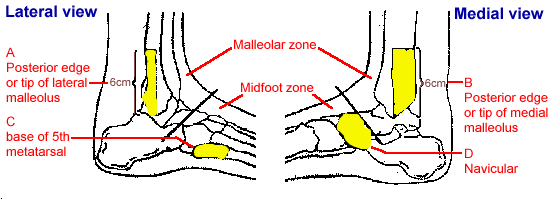Ottawa Rules regarding requirement for foot X-ray
The Ottawa rules have been described and evaluated by Steil et al (1,2).
More recent evidence also supports the Ottawa ankle rules as an accurate instrument for excluding fractures of the ankle and mid-foot. The instrument has a sensitivity of almost 100% and a modest specificity, and its use should reduce the number of unnecessary radiographs by 30-40% (3).

Diagram reproduced with permission from www.gp-training.net
Ottawa Rules with Respect to Ankle X-rays
An ankle x-ray is required only if there is any pain in malleolar zone and any of these findings:
- boney tenderness at the lateral malleolar zone A (from the tip of the lateral malleolus to include the lower 6 cm of posterior border of the fibular)
- boney tenderness at the medial malleolar zone B (from the tip of the medial malleolus to the lower 6 cm of the posterior border of the tibia)
- inability to walk four weight bearing steps immediately after the injury and in the emergency department
Ottawa Rules with Respect to Foot X-rays
A foot x-ray is required if there is any pain in the midfoot zone and any of these findings:
- bone tenderness at Navicular bone (C)
- bone tenderness at base of the 5th metatarsal (D)
- inability to weight bear both immediately and in the emergency department
Ottawa Rules with Respect to Knee X-rays
An xray is indicated in patients with knee injuries with any of the following:
- age 55 years or older
- tenderness at the head of the fibula
- isolated tenderness of the patella
- inability to flex knee to 90 degrees
- inability to walk four weight bearing steps immediately after the injury and in the emergency department
Notes:
- the Ottawa ankle rules apply to children from the age of 3 years to adults up until the age of 55 years
- tenderness over the navicular, calcaneum, base of 5th metatarsal or proximal fibula require specific xrays to exclude fractures
- the Ottawa ankle rules appear to be a reliable tool to exclude fractures in children greater than 5 years of age presenting with ankle and midfoot injuries (4)
Reference:
- Stiell IG et al.Multicentre trial to introduce the Ottawa ankle rules for use of radiography in acute ankle injuries BMJ 1995;311:594-597
- Stiell IG et al. Implementation of the Ottawa ankle rules. JAMA 1994;271:827-32
- Bachmann LM et al. Accuracy of Ottawa ankle rules to exclude fractures of the ankle and mid-foot: systematic review BMJ, Feb 2003; 326: 417.
- Dowling S et al.Accuracy of Ottawa Ankle Rules to exclude fractures of the ankle and midfoot in children: a meta-analysis. Acad Emerg Med. 2009 Apr;16(4):277-87
Create an account to add page annotations
Annotations allow you to add information to this page that would be handy to have on hand during a consultation. E.g. a website or number. This information will always show when you visit this page.